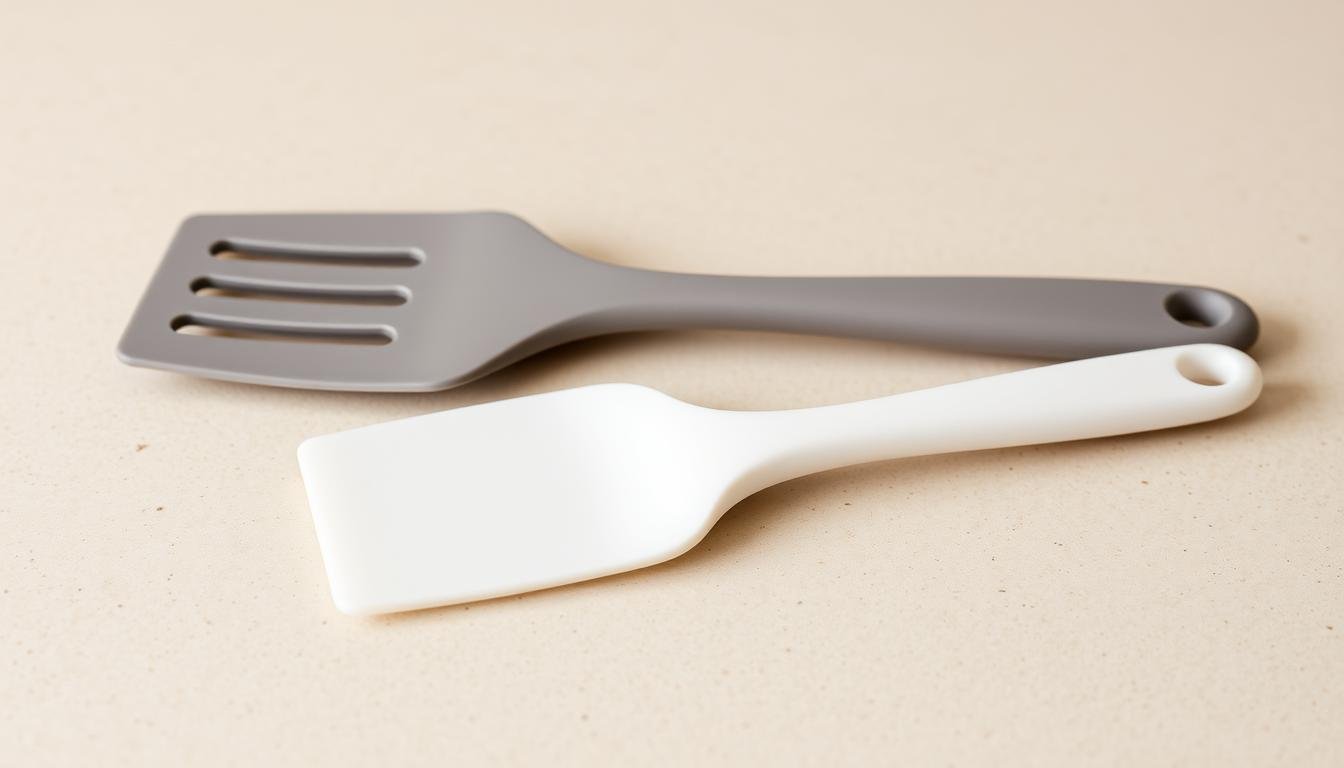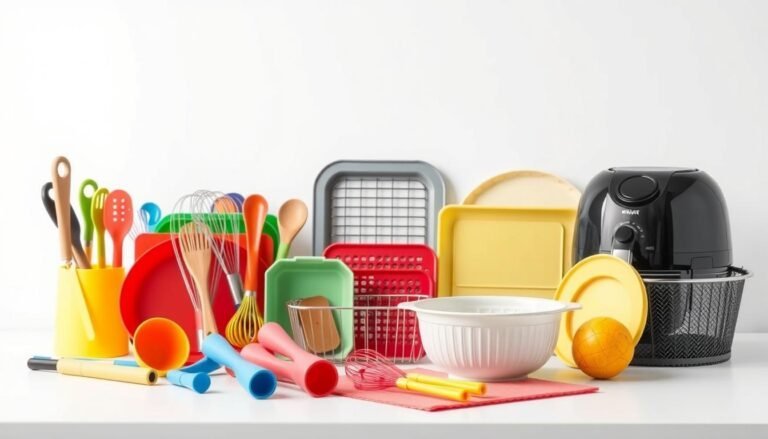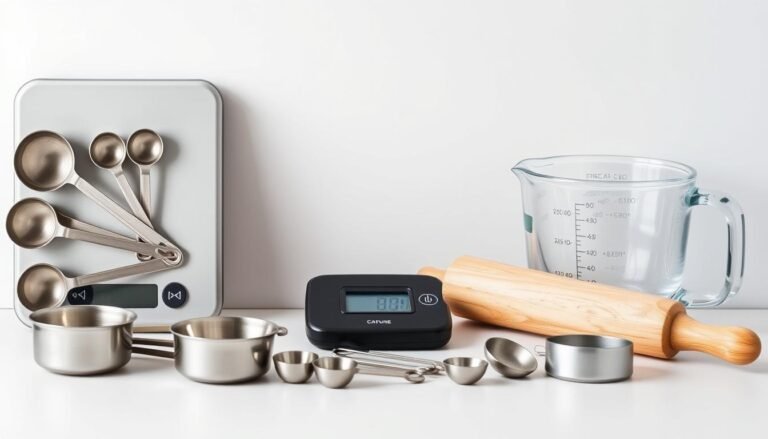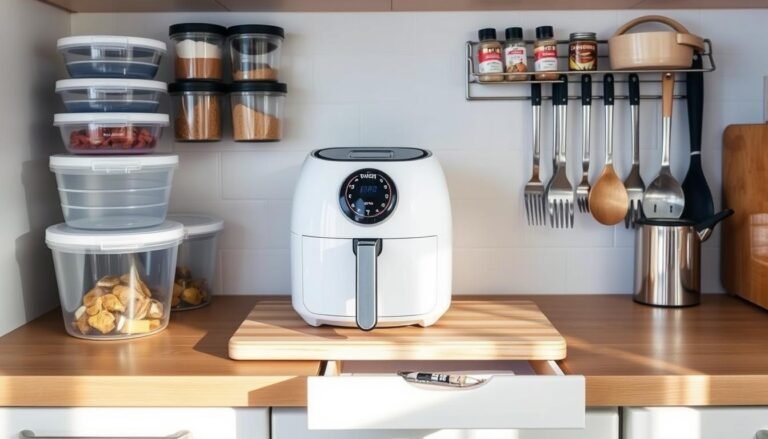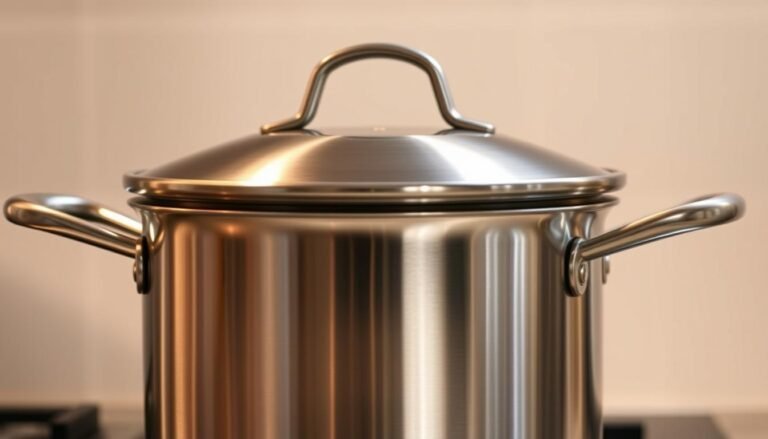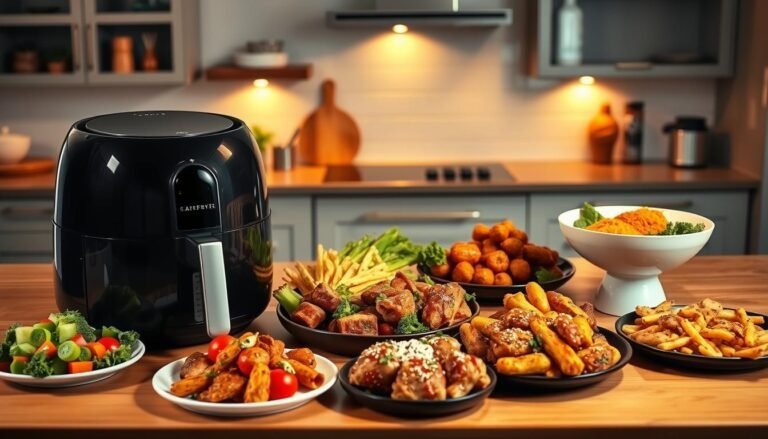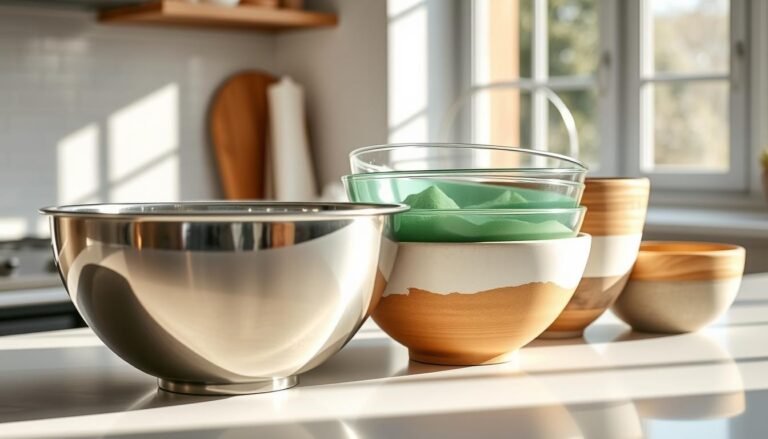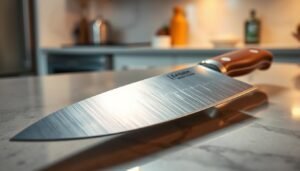Disclosure: This Post Contains Affiliate Links; We earn a commission on purchases.
Choosing the right tools for cooking and baking is key. Rubber spatulas and silicone spatulas are must-haves. They help with scraping bowls, mixing, and serving.
Deciding between a rubber spatula and a silicone spatula can be tricky. It depends on heat resistance, durability, and how flexible they are.
This article will help you understand the differences. You’ll learn which spatula is best for your kitchen.
Key Takeaways
- Understanding the differences between rubber and silicone spatulas.
- Factors to consider when choosing a spatula for your kitchen.
- The benefits of using the right spatula for specific cooking tasks.
- How heat resistance and durability impact spatula performance.
- Tips for selecting the best spatula based on your cooking needs.
Understanding Kitchen Spatulas
Kitchen spatulas are key in cooking. They come in many shapes, sizes, and materials. This makes them great cooking utensils for flipping, turning, scraping, and spreading.
The Evolution of Kitchen Spatulas
The history of kitchen spatulas shows how they’ve changed. From simple flat tools to advanced designs, they’ve evolved. Now, they’re made from various materials, making them better for cooking.
Why Spatulas Are Essential Kitchen Tools
Spatulas are vital for both cooking and baking. They’re a must-have baking spatula for precise tasks. Their flexibility and strength make them a must-have in every kitchen.
What Makes a Rubber or Silicone Spatula Different?
Knowing the difference between rubber and silicone spatulas is key for cooks at home or in the kitchen. Their materials, how they’re made, and their structure all matter. These factors affect how well they work in the kitchen.
Material Composition
Rubber spatulas are made from natural or synthetic rubber. They are flexible and gentle on cookware. On the other hand, silicone spatulas are made from synthetic silicone. They are heat-resistant and last long.
Silicone spatulas can handle temperatures up to 500°F. This makes them great for cooking at high heat.
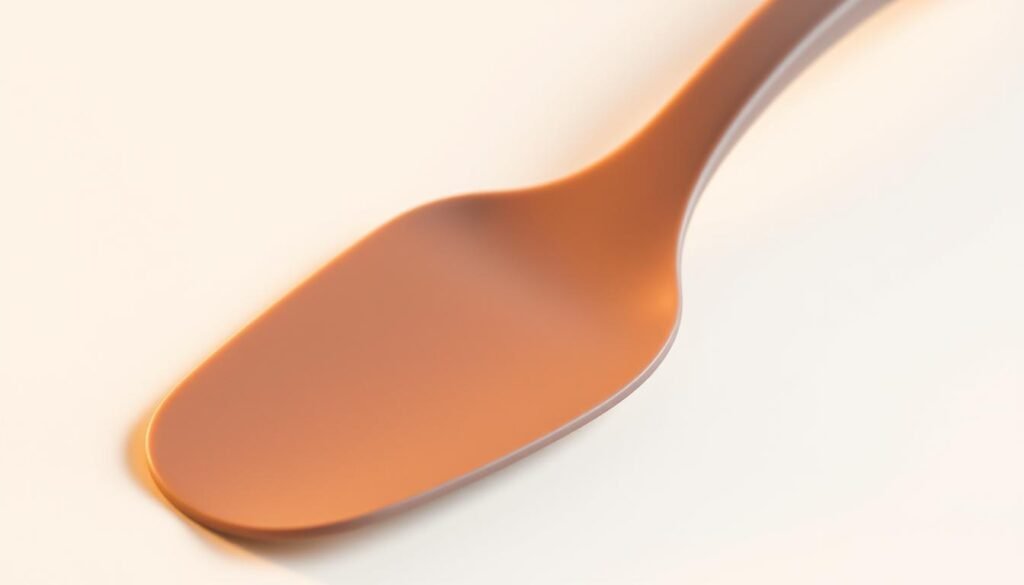
Manufacturing Process
The way rubber and silicone spatulas are made is different. Rubber spatulas are molded or vulcanized. Silicone spatulas are injection-molded. This affects their quality and how well they perform.
Key Structural Differences
Rubber and silicone spatulas differ in structure. Silicone spatulas are stiffer and less flexible than rubber ones. But, they can handle heat better and last longer.
Rubber Spatulas: Features and Benefits
Rubber spatulas are great because they are flexible and don’t stick. They are key in many kitchens. Their special features make them stand out.
Flexibility and Texture
Rubber spatulas are very flexible. They are softer than silicone ones. This makes them perfect for getting every bit from bowls and pans.
Their texture is also kind to cookware. It won’t scratch non-stick surfaces.
Handling Capabilities
Rubber spatulas have handles that are easy to hold. This makes them great for mixing or folding ingredients.
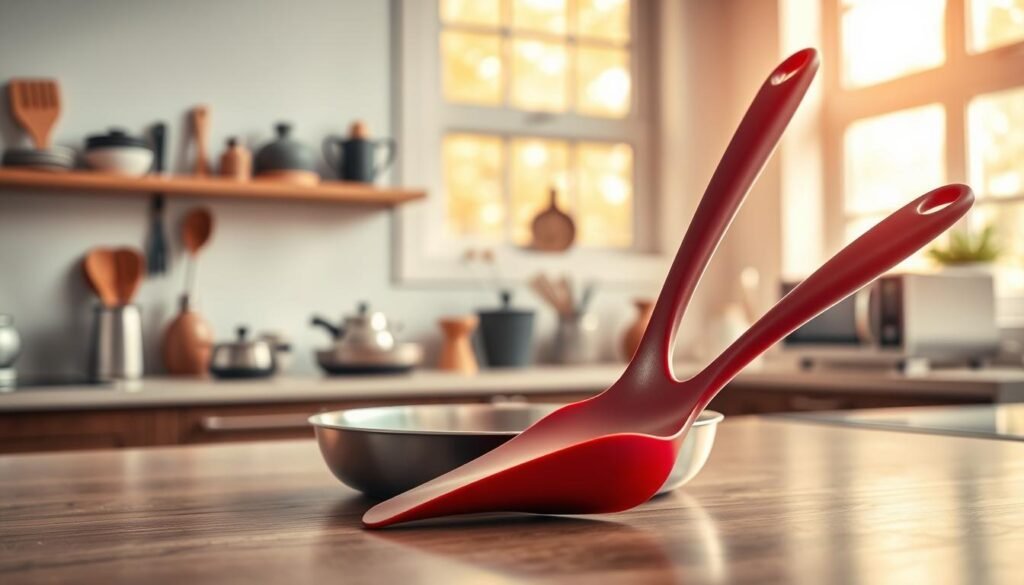
Price Points
Rubber spatulas are cheaper than silicone ones. Prices are from a few dollars to ten dollars. This depends on the brand and quality.
Identifying Quality Rubber Spatulas
Look for durable, non-stick rubber in a good rubber spatula. The handle should be comfy and well-attached. A quality spatula is flexible but not too thin. It should scrape well without breaking.
Silicone Spatulas: Features and Benefits
Silicone spatulas are great because they are flexible and can handle heat well. They are a must-have in many kitchens. People love them for being tough and useful.
Heat Resistance Properties
Silicone spatulas can handle high heat without breaking down. This is perfect for frying or baking. They stay strong even when it’s hot.
Durability Factors
Silicone spatulas last a long time. They are tougher than rubber spatulas, says Siliconemania.com. This means they can be your kitchen friend for years.
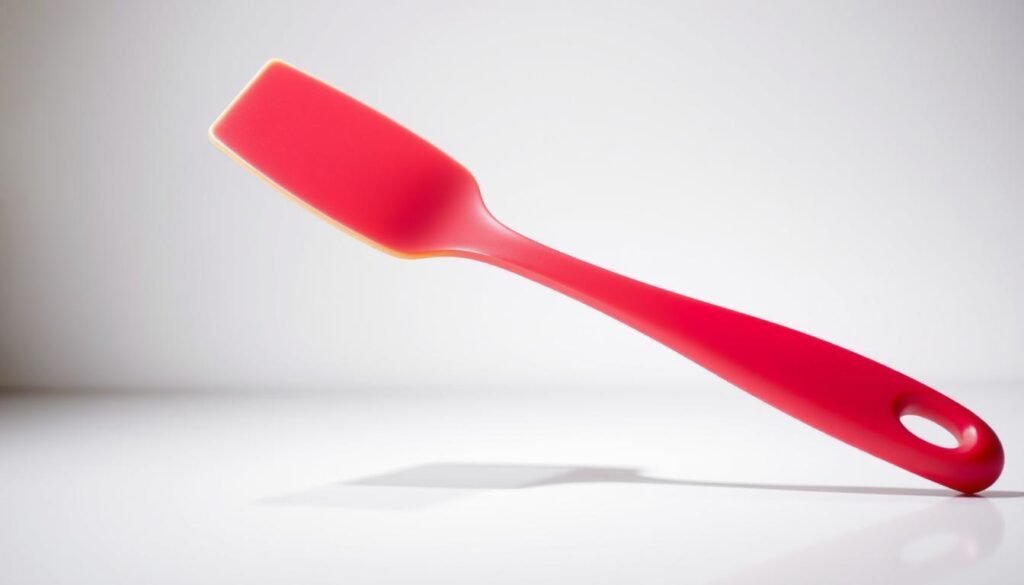
Price Considerations
The cost of silicone spatulas depends on the brand, quality, and size. They are usually priced well, making them easy to add to your kitchen.
How to Spot High-Quality Silicone
Look for 100% food-grade silicone to find top-notch spatulas. They should have a strong handle and a flexible blade. Also, they should be made without seams to prevent food from sticking.
Head-to-Head Comparison: Rubber or Silicone Spatula
In the kitchen, picking between a rubber and a silicone spatula is important. It’s not just about what you like. It’s about how well they work for different tasks.
Heat Resistance Comparison
Silicone spatulas can handle very high temperatures without melting. This makes them great for cooking at high heat. Rubber spatulas, on the other hand, can get damaged by heat. They’re better for cooler cooking tasks.
Durability and Longevity
Silicone spatulas last longer than rubber ones if you take care of them. They don’t break or crack easily. Rubber spatulas, though flexible, can wear out faster, even with gentle use.
Stain and Odor Resistance
Silicone spatulas don’t hold onto stains or smells because they’re non-porous. This makes them easy to clean. Rubber spatulas can soak up stains and smells over time.
Flexibility and Scraping Ability
Both types of spatulas are flexible, but rubber spatulas are more so. They’re better for scraping in tight spots. Silicone spatulas are a bit stiffer and not as precise for scraping.
Environmental Impact
The environmental effect of each spatula depends on how they’re made and how long they last. Silicone spatulas might reduce waste because they last longer. But making silicone is more complex than rubber, affecting the environment differently.
Choosing between a rubber and a silicone spatula depends on your cooking needs. Think about heat resistance, durability, and flexibility. This will help you pick the right one for your cooking.
Best Uses for Each Type of Spatula
Knowing when to use rubber or silicone spatulas is key in cooking and baking. Each type has special traits for different tasks.
When to Use Rubber Spatulas
Rubber spatulas are great for tasks needing flexibility and care. They’re best for:
- Scraping the sides and bottom of bowls
- Folding ingredients together
- Handling delicate foods
When to Use Silicone Spatulas
Silicone spatulas are durable and can handle high heat. They’re good for:
- High-heat cooking tasks
- Non-stick cookware
- Heavy-duty scraping
Specialized Cooking Techniques
Both types of spatulas work well for sautéing, stirring, and serving. But, silicone spatulas are better for high-heat cooking.
Baking Applications
For baking,
In summary, having both rubber and silicone spatulas makes cooking and baking easier.
Maintenance and Care Tips
Keeping your spatulas in good shape can really help them last longer. Taking care of them means they’ll always be ready for use in your kitchen.
Cleaning and Storing Rubber Spatulas
Wash rubber spatulas by hand with mild dish soap. Don’t use rough scrubbers that can harm them. Dry them well before putting them away to stop bacteria.
Cleaning and Storing Silicone Spatulas
Hand wash silicone spatulas with soap and warm water. You can dry them with a towel or let them air dry. Keep them in a dry spot, out of the sun to keep them flexible.
Extending the Lifespan of Your Spatulas
Don’t let your spatulas get too hot. High heat can warp rubber spatulas. Silicone spatulas are okay with heat, but don’t use them over flames.
When to Replace Your Spatulas
Get new spatulas if they crack, change color a lot, or smell bad. Check them often to know when it’s time for a new one.
Conclusion: Making the Right Choice for Your Kitchen
Choosing between a rubber or silicone spatula depends on your cooking and baking needs. Rubber spatulas are flexible and gentle. They’re great for scraping bowls and folding ingredients.
Silicone spatulas are heat-resistant and durable. They’re perfect for high-temperature cooking and baking.
Think about what you cook or bake most often. If you bake a lot, a rubber spatula might be best. For high-heat cooking, a silicone spatula is better. Siliconemania.com says silicone spatulas are versatile for many cooking techniques.
Having both a rubber and silicone spatula is smart. It prepares you for any cooking or baking task. Knowing the strengths of each helps you make better choices and improve your cooking.
FAQ
What is the main difference between a rubber spatula and a silicone spatula?
Are silicone spatulas more heat-resistant than rubber spatulas?
Can I use a rubber spatula for non-stick pans?
How do I clean and store my rubber or silicone spatula?
Are silicone spatulas more durable than rubber spatulas?
Can I use a silicone spatula for baking?
How often should I replace my rubber or silicone spatula?
Are there any eco-friendly options for rubber or silicone spatulas?

Ryan Conlon is the creator of QuickSimpleAirFryer.com, where he shares easy tips, tricks, and ideas for getting the most out of your air fryer. Focused on speed, flavor, and simplicity, Ryan helps home cooks make crispy, satisfying meals without the mess or hassle of traditional cooking. Whether you’re new to air frying or looking for fresh inspiration, Ryan’s practical advice makes it simple to enjoy quick, delicious results every time.
Subscribe to Our Newsletter

